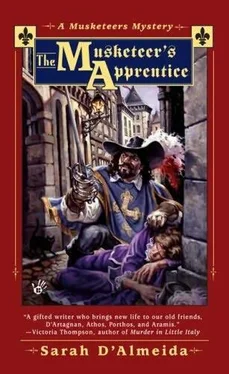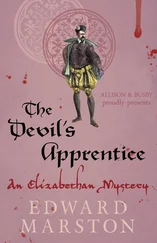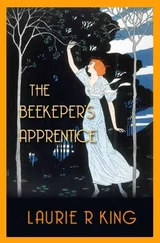Sarah D'Almeida - The Musketeer's Apprentice
Здесь есть возможность читать онлайн «Sarah D'Almeida - The Musketeer's Apprentice» весь текст электронной книги совершенно бесплатно (целиком полную версию без сокращений). В некоторых случаях можно слушать аудио, скачать через торрент в формате fb2 и присутствует краткое содержание. Жанр: Триллер, на английском языке. Описание произведения, (предисловие) а так же отзывы посетителей доступны на портале библиотеки ЛибКат.
- Название:The Musketeer's Apprentice
- Автор:
- Жанр:
- Год:неизвестен
- ISBN:нет данных
- Рейтинг книги:4 / 5. Голосов: 1
-
Избранное:Добавить в избранное
- Отзывы:
-
Ваша оценка:
- 80
- 1
- 2
- 3
- 4
- 5
The Musketeer's Apprentice: краткое содержание, описание и аннотация
Предлагаем к чтению аннотацию, описание, краткое содержание или предисловие (зависит от того, что написал сам автор книги «The Musketeer's Apprentice»). Если вы не нашли необходимую информацию о книге — напишите в комментариях, мы постараемся отыскать её.
In a search for his apprentice's killer, Musketeer Porthos rallies his friends to discover who was responsible, pursuing the truth even as he puts his own life in danger.
The Musketeer's Apprentice — читать онлайн бесплатно полную книгу (весь текст) целиком
Ниже представлен текст книги, разбитый по страницам. Система сохранения места последней прочитанной страницы, позволяет с удобством читать онлайн бесплатно книгу «The Musketeer's Apprentice», без необходимости каждый раз заново искать на чём Вы остановились. Поставьте закладку, и сможете в любой момент перейти на страницу, на которой закончили чтение.
Интервал:
Закладка:
Athos nodded. He’d finished his chicken leg and though he’d eaten far less than his friend, felt as though he’d dined better than he had in months.
They walked to the Comeau residence in silence. Athos was not very talkative at the best of times, and given Porthos’s difficulties in making his words obey him, it was often easier to be silent.
The lodging of the nobleman was a two-floor house, with a busy bakery on the downstairs floor. The smell of warm bread permeated everything and Athos was momentarily regretful that his morals would never allow him to imitate Mousqueton. The bakery had the lease of the downstairs floor entirely, but no lease of the field at the back or the yard that abutted it, which was entered via an arched doorway ineffectually closed by a rectangular iron gate. The gate stood open as the musketeers approached, and in the yard horses and grooms seemed to have set up a welter of activity. Far more grooms and horses, Athos thought, than befit this kind of establishment and which bespoke a horse-mad lord or a horse trader. Since he didn’t think it was the later, it must be the former.
It took a moment for people in the yard to notice the two musketeers at the gate-which spoke unusual absorption in their task, since musketeers normally caused the action to stop wherever they went. Or rather, they could very quickly become the center of the action if ignored.
At last a groom noticed them and, doffing his cap, loped over to them. “Monsieur Musketeers,” he said, stopping just in front of them and bowing deeply. “How may we help you? What can we do to further the service of his Majesty, what-”
“We are here not on the King’s business, but our own,” Athos said, straightening and managing to convey that he was one of the noblest men in the land and that his every word should be listened to.
“Your own?” the groom asked.
“I need to speak to your master,” Athos said. “About one of the… about a boy who was said to have come here last and who has disappeared.”
The groom frowned. “A boy? I don’t recall…”
Athos could have said the boy was not a noble boy. He was sure many commoners had come and gone in here who were less than full grown men. But he didn’t wish to tell the groom that. He knew all too well that in most people’s minds a plebeian boy’s disappearance was unimportant. Indeed, it probably would have been unimportant in Athos’s as well, if he hadn’t seen the small corpse on the floor of their practice room. Because the boy was unimportant, because plebeian boys disappeared and appeared like the sun on a cloudy day, it begged the question of why anyone had found this boy important enough to kill. Not just kill, but poison and then let go, almost guaranteeing that the boy would die away from his murderer. This would ensure the murder must be discovered as such.
Surely most men, on finding they needed to kill the boy, would have hit him on the back of the head and left him for dead in some alley, or some forgotten building, or stabbed him and left the body with every appearance of having died in a brawl. Or… a million other scenarios.
So why kill the boy with poison, and at a time when he would surely be discovered by someone who would care about his death-someone, what was more, who was likely to be of a suspicious turn of mind, and to have access to the ears of those in power? It seemed like a mad thing to do. And in that moment, Athos had the fleeting feeling that he could almost sense something… Something.
As though he stood in a tall place, looking below at the maze that was this murder, he felt as if he could almost see the whole thing, beginning to end and the bit in the middle as well. But the groom said, dubiously, “Well, if you would follow me. My lord is in the stables.”
And Athos was back in the yard with the horses and the busy grooms putting the horses through their paces and brushing them and grooming them. He nodded to the groom, and started to follow.
Porthos grabbed at his arm. “Athos,” he said. “I’ll stay here.”
Athos turned back frowning. “You will? Why? Don’t you have questions to ask Monsieur de Comeau?”
Porthos grinned, flashing that smile that made people think him simple or mad. “No, Athos,” he said. “You have questions to ask Monsieur de Comeau. I shall wait for you here. Between you high lords, you are better served if you speak alone. While I, myself, you know, since I have horse traders in my ancestry, will stay here and watch all these horses, and think to myself about a few things.”
Athos was about to reproach Porthos with silliness and to tell him that no one cared about Porthos’s ancestry but Porthos himself. Or at least, none of Porthos’s friends cared. But Porthos’s eyes were full of speaking mirth, as though he meant to say something else. No, as though he meant for Athos to understand something else that he didn’t want to have to say.
Finding he had opened his mouth, Athos closed it, then nodded curtly. “There is, of course,” he said, slowly, ponderously, looking for Porthos to correct him if he was guessing wrong. “A great advantage in knowing your place in the world.”
Porthos nodded. “Is there not?” he said. “And I know my place exceedingly well, I assure you. I always feel more at home in these kinds of places, with working men… aye, and women, too, who know what to do and what goes on in the bowels of your great houses. You, on the other hand, should go talk to the gentleman who is your equal and who will doubtless receive you with equanimity.”
If Porthos had smiled any wider or more blankly, he would doubtlessly have sprained his jaw, and Athos chose to relieve his friend’s mind by saying, “I understand completely. I will be back in a few moments.”
Porthos nodded and looked about him, till he found a large rock in the middle of the yard, in the full sun of late summer. He sat himself on it, watching horses and working grooms with every appearance of satisfaction.
As Athos turned his back on Porthos, Athos again wondered at Porthos’s seeming simplicity and whether it was truly so, or a degree of cunning so high that even Aramis didn’t fully understand it for what it was. Left in this situation, in the middle of grooms working at the horses, Athos would have sat there, the whole time, mute and wrapped in his own mantle of nobility. Not that he disdained the grooms, but he would have been just as unable to find anything to talk to them about as he would have been of sprouting wings and flying.
Even now, as he moved among them, grooms and servants stepped out of the way and bowed hastily to him, but none would be so bold as to greet him, or to utter a word to him, not even a reverentially whispered “milord.”
However, Porthos would, by the time Athos came back, know the name and age of every groom in the yard, doubtless know if they were married and, if so, if they were faithful or had a girlfriend on the side. He would know the ages of their children, the places of their births and their dearest aspirations.
“Your friend, monsieur is… er… he was, before becoming a musketeer…”
“As noble a gentleman as you might wish to meet,” Athos said and his eyes warned the groom not to pursue it.
Few people could challenge such a look from Athos, and the groom was not equal to it. He nodded and turned, and led Athos down the length of the yard, past as many fine examples of horseflesh as Athos had seen gathered in one place, to the door at the far stable, where he left Athos to wait, while-presumably-he was announced.
Athos waited a long while. From inside came a warble of voices. The groom’s muttered tones, answered by louder, impatient tones from a male voice. And there was… confused shouting.
Of course, etiquette dictated that Athos wait outside for the groom to return. Athos quite understood that, having been trained in etiquette by his father, who had been something of a taskmaster on the matter. And he quite understood that he shouldn’t barge in. But when one was investigating a murder in Paris, these days and under these circumstances, with the Cardinal behind the scenes, possibly manipulating all, sometimes the best course was to intervene, before dastardly deeds could be accomplished.
Читать дальшеИнтервал:
Закладка:
Похожие книги на «The Musketeer's Apprentice»
Представляем Вашему вниманию похожие книги на «The Musketeer's Apprentice» списком для выбора. Мы отобрали схожую по названию и смыслу литературу в надежде предоставить читателям больше вариантов отыскать новые, интересные, ещё непрочитанные произведения.
Обсуждение, отзывы о книге «The Musketeer's Apprentice» и просто собственные мнения читателей. Оставьте ваши комментарии, напишите, что Вы думаете о произведении, его смысле или главных героях. Укажите что конкретно понравилось, а что нет, и почему Вы так считаете.










